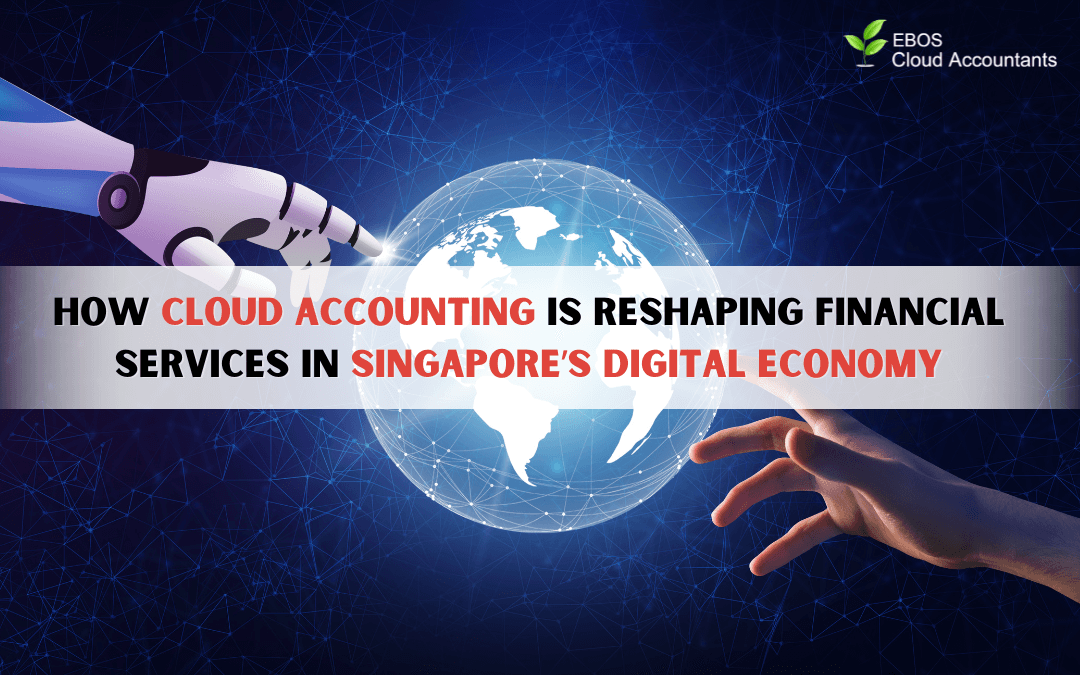Technology is driving a shift in financial services as Singapore continues its path to become a global center for digital innovation. Cloud accounting is one of the most significant breakthroughs, changing the way financial services are provided and administered. In addition to increasing corporate operational efficiency, this change is crucial for advancing Singapore’s larger objectives in the digital economy. Cloud accounting is changing Singapore’s financial scene in a number of ways, including better financial administration, compliance, and decision-making.
The Digital Economy and the Rise of Cloud Accounting
Singapore’s digital economy is built on innovation, with strong government support encouraging the adoption of advanced technologies. Initiatives like the Smart Nation Programme and SME Go Digital Programme reflect the country’s commitment to leveraging digital tools to enhance productivity and economic growth. Cloud accounting fits perfectly into this framework, offering businesses a powerful tool to modernize their financial processes.
Cloud accounting platforms such as Xero, QuickBooks, and Sage have revolutionized traditional accounting by moving financial data and operations online, allowing businesses to manage their financial affairs from anywhere at any time. This flexibility is especially crucial in today’s digital economy, where fast decision-making and agility are key to staying competitive.
Key Ways Cloud Accounting is Reshaping Financial Services
- Real-Time Financial Insights for Better Decision-Making
One of the most significant advantages cloud accounting brings to financial services is real-time access to financial data. In the past, businesses often relied on quarterly or annual financial reports, which could be outdated by the time they were reviewed. With cloud accounting, financial data is updated automatically as transactions occur, providing businesses with up-to-date information on their cash flow, expenses, and profits.
This real-time access allows finance professionals and business leaders to make informed decisions quickly, improving the responsiveness of businesses in a dynamic market. For example, companies can spot financial trends earlier, respond to challenges faster, and capitalize on opportunities with greater agility.
- Enhanced Collaboration Across Teams
Collaboration between internal teams and external stakeholders is crucial in Singapore’s fast-paced financial sector. No matter where they are, numerous users—from accountants to business owners—can access the same financial data at the same time thanks to cloud accounting. Collaboration is encouraged by this shared access, which makes it possible to have talks in real time and make decisions based on the most recent financial facts.
Cloud accounting also makes it easier for businesses to collaborate with external financial advisors, auditors, and consultants. Accountants can review financial records remotely, provide insights, and recommend strategies without the need for in-person meetings or time-consuming email exchanges. This level of collaboration is especially beneficial in Singapore, where businesses often operate in a regional or global context.
- Automating Routine Financial Tasks
Automation is one of the standout features of cloud accounting platforms. Financial tasks that once took hours—such as invoicing, payroll processing, and bank reconciliation—can now be automated with just a few clicks. Automation not only saves time but also reduces the risk of human error, ensuring that financial records are accurate and up to date.
For businesses in Singapore, where labor costs are high and efficiency is paramount, this automation delivers substantial cost savings. Finance professionals can redirect their focus from manual tasks to higher-value activities, such as financial analysis, strategic planning, and business development.
- Compliance and Regulatory Adherence
Businesses operating in Singapore must abide by stringent laws established by organizations like the Inland Revenue Authority of Singapore (IRAS) and the Accounting and Corporate Regulatory Authority (ACRA). By automatically producing reports that comply with regional accounting standards and tax laws, cloud accounting solutions help firms stay in compliance.
Cloud accounting tools can also alert businesses to upcoming deadlines, such as filing for corporate taxes, annual returns, or Goods and Services Tax (GST) submissions. This ensures that businesses avoid costly penalties due to late filings or inaccuracies. In addition, these platforms often integrate directly with government portals, making it easier to submit filings and stay compliant with Singapore’s legal requirements.
- Scalability and Flexibility for Growing Businesses
Scalability is becoming more and more crucial as Singapore continues to draw small firms and startups. Platforms for cloud accounting are made to expand with companies, providing adaptable solutions that can meet changing demands. Cloud accounting platforms enable financial operations to be scaled without the need for expensive software upgrades or extra resources, regardless of the size of the company—from a small startup to a growing SME.
Moreover, cloud accounting tools offer a flexible pay-as-you-go subscription model, allowing businesses to select the features and services they need based on their size and requirements. This ensures that businesses only pay for what they use, making cloud accounting an affordable solution for companies at any stage of growth.
- Data Security and Risk Mitigation
In today’s digital economy, data security is a top concern for businesses, particularly in financial services. Cloud accounting platforms offer robust security measures, including encryption, multi-factor authentication, and regular backups, to protect sensitive financial information. These platforms are also built to comply with international data protection standards, giving businesses in Singapore confidence that their financial data is secure.
For businesses handling large volumes of confidential financial data, such as those in the financial services sector, cloud accounting provides peace of mind. By storing data in the cloud rather than on local servers, businesses reduce the risk of data loss due to hardware failures, natural disasters, or cyberattacks.
Cloud Accounting’s Role in Singapore’s Digital Economy
It is anticipated that Singapore’s digital economy would keep expanding quickly, with the financial services industry being a major factor in this growth. Because cloud accounting makes it possible for companies to implement more flexible, effective, and transparent financial procedures, it supports Singapore’s aim of a digital-first economy.
Cloud accounting is one of the technologies that businesses are encouraged to use by the government’s continuous support for digital transformation through tax incentives and subsidies for digital adoption. Businesses that use cloud accounting benefit from cost reductions and operational efficiencies, which allow them to make investments in more innovation and expansion. This generates a positive feedback loop.
Additionally, cloud accounting makes financial management across borders easier for Singaporean companies that are growing internationally. International firms may easily manage their money across several markets with the help of numerous cloud platforms that handle multiple currencies, guaranteeing compliance with diverse regulatory standards while preserving a centralized financial system.
Conclusion
By providing real-time information, enhancing collaboration, automating repetitive activities, and guaranteeing compliance, cloud accounting is completely changing Singapore’s financial services industry. Cloud accounting solutions are expected to become more widely used as the country maintains its position as a leader in the global digital economy, which will boost productivity and expansion for companies of all kinds.
Cloud accounting is more than just a financial management tool for Singaporean businesses and finance professionals; it’s a strategic asset that facilitates more flexible decision-making, supports compliance in a complex regulatory environment, and helps the company succeed in the long run in the digital era.
Check out our website at https://ebos-sg.com/ to explore more articles and discover how our Cloud Accountant Services can support you on your business.







